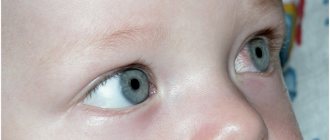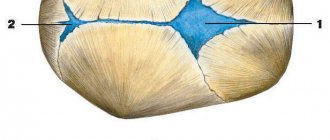The inflammatory process in the thymus is called thymitis. It usually is not an independent disease, but occurs secondary to damage to the anterior mediastinum (the space between the lungs and the sternum) - mediastinitis. All organs located in this area are not separated, and the movements of the lungs, heart, large arteries, trachea and esophagus contribute to the rapid spread of infection.
Read about the causes of the pathological process, symptoms and treatment methods further in our article.
The role of the thymus gland in the body
The main function of this organ is to “teach” lymphocytes immune defense. These cells recognize a foreign protein (antigen), transmit information about it and participate in its destruction. The second purpose of the thymus is the formation of hormones, which are also involved in immune reactions, but in a child their role is broader:
- physical development, muscle strength;
- formation of blood cells by the bone marrow;
- exchange of calcium, phosphorus and carbohydrates;
- maintaining the required energy supply;
- synthesis of pituitary hormones - somatotropic (provides growth), regulating the functioning of the thyroid gland, adrenal glands, responsible for puberty.
We recommend reading the article about the functions of the thymus gland. From it you will learn about the structure of the thymus gland, the biological role and dysfunction of the thymus gland.
And here is more information about diseases of the thymus gland.
Organ enlargement and consequences
Depending on the period of life, the significance and manifestations of thymus enlargement (thymomegaly) differ.
In the fetus
With the advent of more sensitive equipment for obstetric ultrasound, as well as the use of MRI, it has become possible to determine the size of the fetal thymus gland. As they increase, the risk of congenital malformations increases:
- insufficiently formed adrenal glands;
- abnormal structure of the aorta (narrowing, coarctation);
- immaturity of the central nervous system, brain;
- disruption of the thyroid gland, pituitary gland, hypothalamus;
- congenital deficiency of immune defense.
Enlargement of the thymus gland in the fetus
In a newborn and infant
Exceeding the normal size of the thymus gland in infants is a reflection of disturbances in the intrauterine period of development. Increase the incidence of congenital thymomegaly:
- hereditary predisposition;
- mother's age under 18 and after 35 years;
- the presence of chronic diseases, especially diabetes;
- stress;
- toxicosis, miscarriage, Rh conflict;
- lack of nutrition for the fetus due to poor blood flow through the placenta;
- the effect of physical factors - radiation, injury, and chemical factors - contact with harmful substances at work.
Children with congenital thymomegaly most often have 2-3 diagnoses before the age of one.
They are diagnosed with diseases:
- respiratory system, including abnormalities in the development of the lungs and bronchi;
- heart muscle (often cardiomyopathy);
- movement disorders, changes in the skeletal system;
- disorders of the structure of the heart and large vessels.
In a preschool child and teenager
The maximum number of cases of thymomegaly is diagnosed before 3 years of age; it is rarely found in schoolchildren, and in adolescents there is mainly a temporary increase due to infections. The acquired form most often occurs with adrenal insufficiency and diseases of the hypothalamus.
Children with a persistently large thymus gland often suffer from viral infections, bronchitis, sore throat, pneumonia, and inflammation of the ENT organs. The diseases become protracted and the following are noted:
- low response to antibacterial therapy;
- tendency to repeated exacerbations, a long period of elevated body temperature to subfebrile (37.1-37.5 degrees);
- low blood pressure;
- abnormal heart rhythm;
- increased sweating.
Low-grade fever (37.1-37.5 degrees)
In adults
Normally, the thymus gland gradually decreases in volume, turning into several clusters of functioning cells against the background of fatty tissue. When a thymus is detected that is larger in size than the age norm, most often there is a suspicion of the formation of a tumor - thymoma. It can have a benign course or exhibit the ability to grow rapidly and penetrate into neighboring organs and lymph nodes.
When such a possibility of metastasis is acquired, the thymoma becomes malignant.
After vaccination
Since the introduction of a vaccine or serum is the penetration of a foreign protein into the body, the thymus naturally begins the active formation of T-lymphocytes to fight. An increase in the size of the organ and an abundant flow of blood to it were noted.
This reaction is normal and does not require specific treatment. In approximately 10% of patients it is absent. This is regarded as an insufficient degree of immune protection. Such children should undergo an immunological examination one month after vaccination.
If the thymus gland is initially large, vaccinations may be canceled for six months, with the exception of the polio vaccine. They are considered temporarily contraindicated if the shadow of the thymus on the radiograph exceeds 75% of the chest. In other cases, the pediatrician may prescribe:
- take antiallergic medications (Diazolin, Suprastin) five days in advance;
- an hour after vaccination - Furosemide;
- carry out treatment with T-activin, and after 2 months - vaccination.
Prevention
In order for the newborn to have a healthy thymus gland, the expectant mother must take a number of preventive measures during pregnancy:
- completely give up alcohol, cigarettes and drugs;
- do not expose the fetus to frequent x-rays;
- beware of infections;
- control your psychological state (in case of stress, it is recommended to meditate, visit a psychotherapist, or calm the nervous system with other methods);
- do not take pharmacological drugs (especially antibiotics and corticosteroids);
- fight toxicosis in time;
- follow all recommendations of the obstetrician-gynecologist and family doctor.
A healthy mother is the key to the health of the future baby!
Symptoms of an enlarged thymus gland
Different manifestations of thymomegaly are found in children and adults.
In a newborn
When a child is born with thymomegaly, typical external features can be detected:
- wide face, torso, feet, hands, fingers;
- the skin is soft, slightly swollen, light;
- The facial features are large, a short nose with a wide bridge, plump lips, a short neck.
A large thymus gland leads to frequent regurgitation, blue discoloration of the nasolabial triangle when crying or feeding. In the first year of life, pneumonia may appear with relapses after recovery.
Blue triangle around the mouth when a child is crying
Preschool and school period
Children have a good appetite and accelerated body growth. In the preschool period they are found to have:
- tendency to burn when exposed to the sun;
- low physical activity, insufficient muscle development;
- pronounced fat layer;
- weak tissue elasticity (skin looseness);
- slight retardation;
- enlarged adenoids, tonsils;
- delayed appearance of teeth, beginning to walk;
- speech functions are not impaired, or children do not pronounce individual sounds for a long time.
Timomegaly can be combined with malformations of the heart, lungs, wide openings of the inguinal canals, navel (hernias appear), disorders of the thyroid gland, kidneys and adrenal glands. Children are prone to seizures, muscle weakness, fatigue, and prolonged fever.
Expert opinion
Alena Ariko
Expert in endocrinology
A characteristic feature is that fever is poorly treatable with conventional drugs (Aspirin, Panadol), but diuretics have a good effect. This is explained by a violation of thermoregulation at the level of the brain (increased intracranial pressure).
Typical for schoolchildren and teenagers:
- frequent acute respiratory viral infections with a prolonged, persistent cough, bronchospasm;
- allergic reactions;
- sinusitis, otitis;
- pneumonia.
The functioning of the endocrine system is disrupted: diabetes mellitus occurs (with a hereditary predisposition), the function of the adrenal glands and thyroid gland decreases, and obesity progresses. In a stressful situation or high body temperature, excessive physical activity, children often lose consciousness.
ARVI with prolonged, persistent cough, bronchospasm
Adults
The enlarged thymus compresses large vessels and neighboring organs. This shows up:
- pain behind the sternum;
- shortness of breath, paroxysmal cough, suffocation;
- breathing becomes noisy, wheezing is heard;
- the veins of the neck and upper chest are dilated;
- the skin takes on a bluish tint.
When thymus tissue grows or a tumor process occurs, a typical symptom complex of myasthenia gravis occurs:
- muscle weakness and fatigue increase;
- drooping eyelids, double vision (worst in the evening);
- difficulty swallowing, chewing, and drinking water.
With a malignant tumor, they are accompanied by fever, nausea, loss of appetite and emaciation.
The causes of thymomegaly in children – heredity or lifestyle?
- Children with thymomegaly are most often born to women who had a difficult pregnancy, who had infectious diseases in the 1st trimester of pregnancy, and who had previously artificially terminated pregnancy. Often this disease is observed in children of women who give birth late, as well as those suffering from nephropathy and toxicosis.
- X-ray exposure of the fetus, taking medications, drinking alcohol and smoking during pregnancy have a great influence on the occurrence of this disease.
- Difficult labor, asphyxia during childbirth and intrauterine development, prematurity of the fetus - all this also contributes to the development of thymomegaly.
- Hereditary predisposition to this disease should not be discounted.
Organ diagnostics
Children undergo chest x-ray, ultrasound of the thymus and adrenal glands. For adults, tomography of the mediastinal organs (the space behind the breastbone between the lungs and heart) is prescribed. The following is found in the child's blood:
- decrease in the level of T-lymphocytes and mature B-lymphocytes;
- decreased immunoglobulins G and A, increased E and M;
- low levels of cortisol, pituitary adrenocorticotropin, increased growth hormone and thyroid stimulating hormone.
For adults, myography is necessary to determine the degree of muscle weakness. When Proserin is administered, muscle strength is restored, which is typical for myasthenia gravis caused by thymus diseases.
Watch the video about the diagnostic method - myography:
How to detect thymitis
At an early stage, signs of the disease are extremely difficult to detect. It occurs under the guise of pneumonia, pleurisy, pericarditis, and inflammation of the esophagus.
Inflammation can be suspected based on the following signs:
- pain behind the sternum intensifies if you tap on it, tilt or tilt your head back;
- there is swelling on the anterior surface of the chest, dilated veins;
- the supraclavicular fossae are smoothed.
To make a diagnosis, the following is prescribed:
- radiography - the mediastinal shadow is expanded, there may be air or liquid in the chest;
- esophagogastroduodenoscopy – needed to examine the integrity and condition of the esophagus;
- bronchoscopy – helps to examine the airways;
- Ultrasound of the mediastinum - allows you to exclude or detect pleurisy, pericarditis (inflammation of the peripulmonary and pericardial cavities);
- puncture (puncture) of the mediastinum with culture of the collected fluid to determine the pathogen and its sensitivity to antibiotics.
Treatment of an enlarged thymus gland
Frequently ill children with minor thymomegaly are prescribed biostimulants (schisandra, eleutherococcus), ascorbic acid, and licorice root decoction. For established immunodeficiency, T-activin, Timalin, Etimizol are used.
Before surgery, in case of severe infections or stress, adrenal hormones are prescribed to prevent sudden death syndrome. This is justified by the fact that with thymomegaly there may be a crisis due to their deficiency. The doctor may also recommend hydrocortisone or
- severe weakness;
- a sharp drop in blood pressure, slow heart rate;
- profuse vomiting;
- cold profuse sweat;
- temperature drop below 36 degrees.
Signs of the disease
It is important to identify the disease before it reaches the second stage. There are several main symptoms:
- A bright vascular pattern appears on the skin.
- Increase in the size of the soft palate, growth of adenoids and tonsils.
- Changes in lymph node parameters.
- Appearance of a rash.
- Low blood pressure.
- Arrhythmia.
- Fast weight gain.
- Underdevelopment of the genitals.
- Feet and palms are too cold.
Experts identify several more symptoms characteristic of infants. These include:
- High birth weight.
- Excessive paleness of the skin.
- When crying, the baby's skin turns blue.
- Increased sweating.
- In the absence of colds, cough and fever are observed.
- Spitting up too often.
If you notice such symptoms, you should immediately consult your pediatrician.
If treatment is not started, thymomegaly can cause serious illness.











